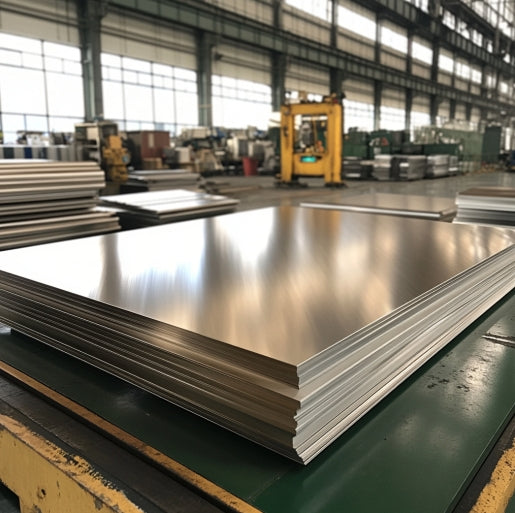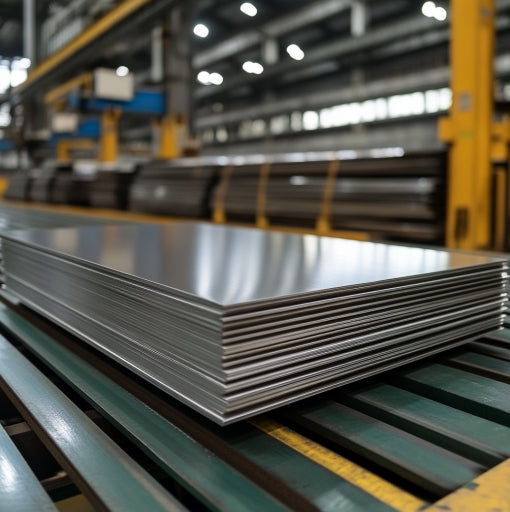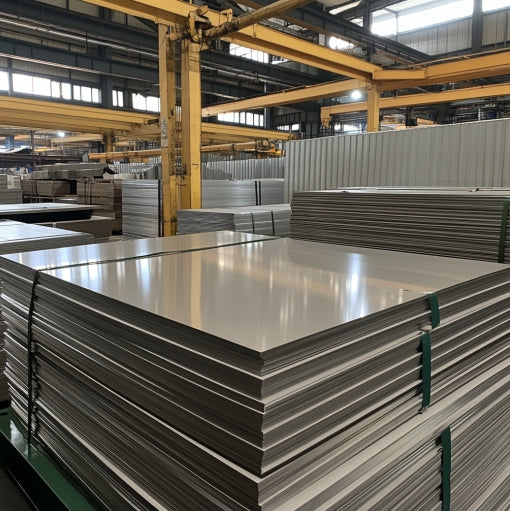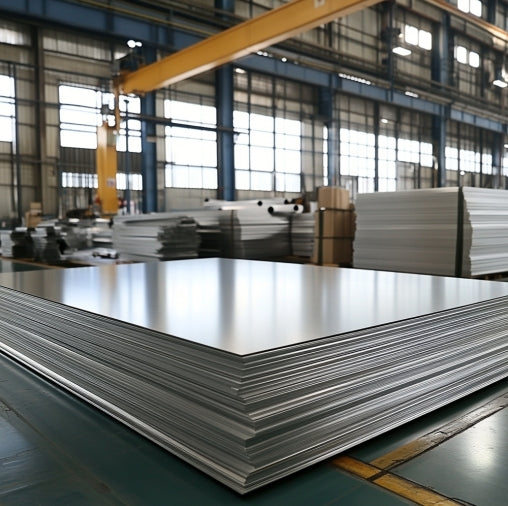StockSteel
Stainless Steel Plate/Sheet | High-Quality Industrial Grade
Stainless Steel Plate/Sheet | High-Quality Industrial Grade
Couldn't load pickup availability
Stainless Steel Plate/Sheet Product Details
Specifications & Properties
| Parameter | Details |
|---|---|
| Material Grades | 201, 304, 316L, 409, 430, 310S, 2205 (Duplex), 410, 630 (17-4PH) |
| Thickness Range | 0.3–100 mm (Cold Rolled: 0.3–8 mm; Hot Rolled: 1.5–100 mm) |
| Width | 20–2500 mm (Standard) / Customizable up to 3000 mm |
| Hardness (HV) | Austenitic: 150–200 HV |
| Surface Finish | 2B, BA, No.4, HL (Hairline), Mirror, Diamond (Checkered), Embossed |
| Tolerance | ±0.01 mm (Thickness) / ±0.2 mm (Width) |
| Density | 7.93 g/cm³ (304/316) / 7.75 g/cm³ (409/430) |
| Processing Techniques | Cold/Hot Rolling, Precision Slitting, Annealing, Pickling, Tempering |
Mechanical & Functional Properties
Tensile Strength
stainless steel sheet plate for sale exhibits tensile strengths ranging from 450–1035 MPa, depending on the grade and processing method. For example:
- Grade 304: 515–620 MPa (Annealed) / 860 MPa (Cold Worked), ideal for food processing and architectural applications.
- Grade 409: 450–550 MPa, optimized for automotive exhaust systems due to moderate heat resistance.
- Martensitic 410: 760–827 MPa (Tempered), suitable for high-stress components like valves and turbine blades.
Bending Strength
Bending performance correlates with ductility and yield strength. For instance:
- Austenitic 316L: Yield strength of 290 MPa ensures excellent formability for stainless steel diamond plate sheets used in industrial flooring and stair treads.
- Ferritic 430: Higher chromium content (16–18%) enhances corrosion resistance but requires controlled bending radii to avoid cracking.
Identification & Marking
Stainless steel plates are marked per international standards:
- ASTM/ASME: Laser-engraved grade (e.g., "304"), heat number, and manufacturer’s logo.
- ISO/DIN: Material numbers (e.g., 1.4512 for 409) and dimensional tolerances.
- Certifications: Mill Test Reports (MTRs) validate chemical composition and mechanical properties.
Weight Calculation
Weight (kg/m²) = Thickness (mm) × Width (mm) × Length (m) × Density (g/cm³) / 1,000
Example: A stainless steel 409 sheet plate measuring 1.2 mm × 1000 mm × 1 m weighs:
1.2 × 1000 × 1 × 7.75 / 1,000 = 9.3 kg/m².
For bulk orders, total coil weight = kg/m² × coil length (m).
Why Does Stainless Steel Rust?
While stainless steel diamond plate sheets are corrosion-resistant, rust can occur under specific conditions:
- Low Chromium Content: Grades like 409 (<10.5% Cr) lack sufficient chromium oxide layer formation.
- Chloride Exposure: Coastal or industrial environments accelerate pitting corrosion in non-stabilized grades (e.g., 304 vs. 316L).
- Galvanic Corrosion: Contact with carbon steel in electrolytes creates electrochemical degradation.
- Mechanical Damage: Abrasive tools or scratches expose raw steel to oxidation.
- High-Temperature Oxidation: Prolonged exposure above 400°C degrades protective layers in grades without titanium stabilization (e.g., 321).
Why Choose Our Stainless Steel Plates?
- Material Diversity: 20+ grades, including stainless steel 409 sheet plate (automotive), duplex 2205 (offshore rigs), and 310S (furnace components).
- Precision Manufacturing: CNC-controlled rolling ensures ±0.01 mm tolerance for aerospace and medical sectors.
- Global Certifications: ASTM A240, A666, EN 10088-2, and PED 2014/68/EU compliance.
- Custom Solutions: Tailored stainless steel sheet plate for sale options, including diamond patterns, embossed finishes, and PE/PVDF coatings.
- Quality Assurance: Third-party testing for intergranular corrosion (ASTM A262), hardness (Rockwell C), and hydrostatic pressure.







